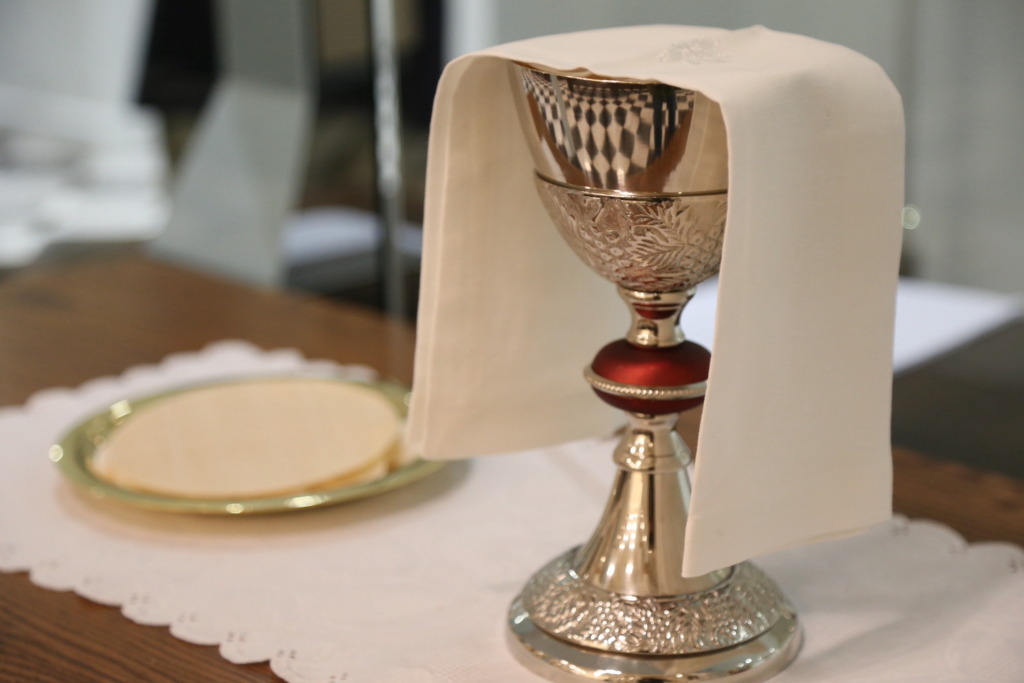With our pastoral year well underway, and given the time, talent and resources our diocese and parishes commit to a variety of programs, ministries and various forms of outreach, it is important that in all we do, we recognize that the Eucharist is at the heart of it, that we accept Jesus’ invitation to encounter him in this sacrificial meal.
As many of you know, there is concern within the Catholic community that, according to a 2019 Pew Research Center survey, 69% who self-identify as Catholics do not believe that the Eucharist is the Real Presence of Jesus Christ. We can lament that our catechesis on the Eucharist during the last half century has not been effective or we can renew our engagement with them in our catechetical efforts so that all Catholics recognize and accept what Christ desires for us. But we can’t start there.
Rather, we can start by re-catechizing ourselves through prayer, eucharistic devotion and focused reflection of what we are doing and who we are receiving when we come forward at Communion. St. Augustine offered succinct but powerful instruction regarding the Eucharist: “Behold what you are; become what you receive.” When we receive the Body of Christ, we are encountering Jesus and accepting his invitation to become like him. We also know that in becoming like Jesus, we must be willing to heed what he told his disciples: “Whoever wishes to come after me must deny himself, take up his cross and follow me” (Mt 16:24).
In the apostolic letter “Desiderio Devsideravi” regarding the liturgical formation of Catholics that Pope Francis issued on June 29, he wrote, “Christian faith is either an encounter with him alive, or it does not exist.”
That encounter occurs at Mass. In Communion, Christ reaches out to us to heal us and strengthen us. He is the spiritual food that sustains us with his presence by our encounter with the Paschal Mystery.
Referencing the words of St. Augustine, our Holy Father notes that the Eucharist is a sacrament of mercy, a sign of unity and a bond of charity.
When we receive Communion, we are accepting the healing and mercy that Christ alone can give. Eucharist is a sacrament in which we receive his forgiveness. No matter how deep our pains and hurts are, he comes to heal them.
At the same time, it is a sacrament of unity capable of bringing us together when we recognize what separates us and causes tension in our personal lives, families and communities — even, at times, our Church communities. In receiving the body of Christ, we are nourished to repair what harms and divides the Body of Christ.
As for Eucharist being a bond of charity, Pope Francis stated, “A celebration (of Mass) that does not evangelize is not authentic, just as a proclamation that does not lead to an encounter with the risen Lord in the celebration is not authentic. And then both of these, without the testimony of charity (emphasis added), are like sounding a ‘noisy gong or a clanging cymbal’ (1 Cor 13:1).”
Throughout the next two years, we will join with Catholics throughout the country in a Eucharistic Revival (https://www.eucharisticrevival.org). There will be multiple opportunities in our diocese and parishes for us to reflect on Eucharist as a source of grace, on our communion with God and our reverence for and adoration of it. Acceptance of Christ’s longing to have this meal with us, this Communion with us, is our call to holiness — an instrument of mercy and forgiveness as much as it is an encounter with our Risen Lord.
This is an opportunity for us to be engaged in the fullness of Jesus’ love for us in the Paschal Mystery. We will grow in holiness the more that we are immersed in Christ’s holiness. In that immersion, we will receive the grace to grow in our communion with God.

